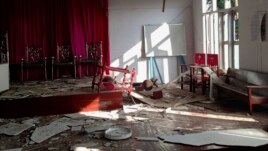30 January 2024
New research provides evidence that attacks by Myanmar's military government have damaged religious centers in the country.
Religious leaders and human rights workers say the reported attacks are part of a wider campaign to attack religious communities across the nation.
A civil war broke out in Myanmar after the military seized power from the elected government of former leader Aung San Suu Kyi in February 2021.

Debris is seen in the St. Peter Baptist Church-Kanan, which was struck by the suspected military's aerial attacks in Kanan village, Khampat town, Sagaing region on Jan. 8, 2024. (David Htan via AP)
Human rights agencies and United Nations investigators say they have found evidence of Myanmar security forces targeting civilians. The evidence includes details about bomb attacks, mass executions and detentions and the burning of private homes.
One group, the Assistance Association for Political Prisoners, accuses security forces in Myanmar of killing at least 4,416 people since the 2021 military takeover.
The Myanmar Witness project completed the new report on the destruction of religious centers. The project is part of the Britain-based Centre for Information Resilience.
Myanmar Witness examined claims of five airstrikes that caused major damage to religious centers over several months in 2023. The attacks happened in Myanmar's western Chin state.
Religious buildings are given special protection under international law.
Another group, the Chin Human Rights Organization, reported that the military has destroyed at least 107 religious buildings in Chin state since 2021. Those included attacks against 67 churches and five Buddhist monasteries, the group said.
A 2023 report by the International Commission of Jurists said 94 Buddhist religious centers and 87 Christian ones had been destroyed or damaged nationwide.
The Myanmar Witness group collects evidence including pictures, video and witness accounts found on social media services. The group compares this evidence with satellite images or other methods to confirm human rights abuses.
Matt Lawrence is director of Myanmar Witness. He said the main goal of the project is to give evidence of "atrocities" to international groups for further investigation.
Many human rights activists have accused the military of aiming for religious buildings.
"Bombing churches is much more than just collateral damage," wrote Benedict Rogers. He is a former East Asia team leader for the human rights organization Christian Solidarity Worldwide. He wrote in an email to The Associated Press, "Targeting them is part of a deliberate strategy."
Rogers said the military government discriminates against non-Burmese ethnic minorities and non-Buddhist religious minorities.
In 2017, the military carried out a counterinsurgency campaign in Rakhine state. The campaign drove almost 740,000 members of the Muslim Rohingya minority to flee to Bangladesh.
The military government offered no immediate comment on the new report.
But in the past, military leaders have repeatedly stated that security forces only attack permissible targets of war.
I'm Bryan Lynn.
The Associated Press reported this story. Bryan Lynn adapted the report for VOA Learning English.
_____________________________________________
Words in This Story
church – n. a building where Christians go to worship
monastery – n. a building where people live as part of a specific religious group
atrocity – n. an extremely violent and shocking attack
collateral damage – n. unintentional deaths, injuries and destruction caused during a war to non-military members
deliberate – adj. intentional or planned
strategy – n. a careful plan to complete something or achieve a goal over a period of time
counterinsurgency – n. a military action taken by a government to prevent attacks by small groups of soldiers or fighters that are opposed to it